- Home
- Sue Grafton
A Is for Alibi Page 4
A Is for Alibi Read online
Page 4
5
Living with the climate in Santa Teresa is rather like functioning in a room with an overhead light fixture. The illumination is uniform—clear and bright enough—but the shadows are gone and there is a disturbing lack of dimension. The days are blanketed with sunlight. Often it is sixty-seven degrees and fair. The nights are consistently cool. Seasonally it does rain but the rest of the time, one day looks very much like the next and the constant, cloudless blue sky has a peculiar, disorienting effect, making it impossible to remember where one is in the year. Being in a building with no exterior windows gives the same impression: a subliminal suffocation, as though some, but not all, of the oxygen has been removed from the air.
I left my apartment at 9:00, heading north on Chapel. I stopped for gasoline, using the self-service pump and thinking, as I always do, what a simple but absurd pleasure it is to be able to do that sort of thing myself. By the time I found K-9 Korners, it was 9:15. The discreet sign in the window indicated that the place opened for business at eight. The grooming establishment was attached to a veterinarian’s office on State Street just where it made the big bend. The building was painted flamingo pink, one wing of it housing a wilderness supply store with a mummy bag hanging in the window and a dummy, in a camping outfit, staring blankly at a tent pole.
I pushed my way into K-9 Korners to the accompaniment of many barking dogs. Dogs and I do not get along. They inevitably stick their snouts right in my crotch, sometimes clamping themselves around my leg as though to do some kind of two-legged dance. On certain occasions, I have limped gamely along, dog affixed, their masters swatting at them ineffectually, saying “Hamlet, get down! What’s the matter with you!?” It is hard to look such a dog in the face, and I prefer to keep my distance from the lot of them.
There was a glass showcase full of dog-care products, and many photographs of dogs and cats affixed to the wall. To my right was a half door, the upper portion opening into a small office with several grooming rooms adjoining. By peering around the doorjamb, I could spot several dogs in various stages of being done up. Most were shivering, their eyes rolling piteously. One was having a little red bow put in its topknot, right between its ears. On a worktable were some little brown lumps I thought I could recognize. The groomer, a woman, looked up at me.
“Can I help you?”
“The dog just stepped on that brown lump,” I said. She looked down at the table. “Oh Dashiell, not again. Excuse me a minute,” she said. Dashiell remained on the table, trembling, while she grabbed for some paper towels, deftly scooping up Dashiell’s little accident. She seemed pretty good-natured about it. She was in her mid-forties with large brown eyes and shoulder-length gray hair, which was pulled back and secured with a scarf. She wore a dark wine-colored smock and I could see that she was tall and slim.
“Are you Gwen?”
She glanced up with a quick smile. “Yes, that’s right.”
“I’m Kinsey Millhone. I’m a private investigator.”
Gwen laughed. “Oh Lord, what’s this all about?” She disposed of the paper towel and moved over to the half door and opened it. “Come on in. I’ll be right back.”
She lifted Dashiell from the table and carried him into a back room just off to the left. More dogs began to bark and I could hear a blower being turned off. The air in the place was dense with heat, scented with the smell of damp hair, and the odd combination of flea syrup and dog perfume. The brown linoleum tile floor was covered with assorted clippings, like a barber shop. In the adjoining room, I could see a dog being bathed by a young girl who worked over an elevated bathtub. To my left several dogs, beribboned, were waiting in cages to be picked up. Another young woman was clipping a poodle on a second grooming table. She glanced at me with interest. Gwen returned with a little gray dog under her arm.
“This is Wuffles,” she said, half clamping the dog’s mouth shut. Wuffles gave her a few licks in the mouth. She pulled her head back, laughing, and made a face.
“I hope you don’t mind if I finish this up. Have a seat,” she said affably, indicating a metal stool nearby. I perched, wishing I didn’t have to mention Laurence Fife’s name. From what Charlie Scorsoni had told me, it would rather spoil her good humor.
Gwen began to clip Wuffles’s toenails, tucking the dog against her body to prevent sudden moves. “You’re local, I assume,” she said.
“Yes, I have an office downtown here,” I said, pulling out my I.D. automatically. I held it toward her so she could read it. She gave it a glance, apparently accepting it without much suspicion or concern. It always amazes me when people take me on faith.
“I understand you used to be married to Laurence Fife,” I ventured.
“Yes, that’s right. Is this about him? He’s been dead for years.”
“I know. His case is being opened up again.”
“Oh, that’s interesting. By whom?”
“Nikki. Who else?” I said. “The Homicide Department knows I’m looking into it and I have their cooperation, if that helps you any. Could you answer some questions for me?”
“All right,” she said. Her tone was cautious but there was also a note of interest, as though she considered it a curious inquiry but not necessarily bad.
“You don’t sound that surprised,” I said.
“Actually I am. I thought that was finished business.”
“Well, I’m just starting to look into it and I may come up with a blank. We don’t have to talk here if it’s inconvenient. I don’t like to interrupt your work.”
“This is fine with me, as long as you don’t mind watching me clip a few dogs. I really can’t afford a time-out right now. We’re loaded today. Hold on,” she said. “Kathy, could you hand me that flea spray? I think we missed a few here.”
The dark-haired groomer left the poodle long enough to reach up for the flea spray, which was passed over to Gwen. “That’s Kathy, as you might have gathered,” Gwen said. “The one up to her elbows in soapsuds is Jan.”
Gwen began to spray Wuffles, turning her face away to avoid the fumes. “Sorry. Go ahead.”
“How long were you married to Fife?”
“Thirteen years. We met in college, his third year, my first. I’d known him about six months I guess.”
“Good years? Bad years?”
“Well I’m mellowing some on that,” she said. “I used to think it was all a big waste but now I don’t know. Did you know Laurence yourself?”
“I met him a couple of times,” I said, “just superficially.”
Gwen’s look was wry. “He could be very charming if he wanted to, but at heart he was a real son of a bitch.”
Kathy glanced over at Gwen and smiled. Gwen laughed. “These two have heard my version about a hundred times,” she said by way of explanation. “Neither has ever been married so I tend to play devil’s advocate. Anyway, in those days I was the dutiful wife, and I mean I played the part with a dedication few could match. I cooked elegant meals. I made lists. I cleaned the house. I raised the kids. I’m not saying I’m anything unique for that, except that I took it awfully to heart. I wore my hair up in this French roll, not a pin out of place, and I had these outfits to put on and take off, kind of like a Barbie doll.” She stopped and laughed at the image of herself, pretending to pull a string from her neck. “Hello, I’m Gwen. I’m a good wife,” she burbled in a kind of nasal parrot tone. Her manner was rather affectionate as though she, instead of Laurence, had died but was remembered fondly by dear friends. Part of the time she was looking at me, and part of the time she combed and clipped the dog on the table in front of her, but in any event her manner was friendly—hardly the bitter, withdrawn account I’d expected.
“When it was over, I was pretty angry—not so much at him as at myself for buying into the whole gig. I mean, don’t get me wrong. I liked it at the time and it suited me fine, but there was also a form of sensory deprivation going on so that when the marriage blew up, I was totally unequipped to deal with the r
eal world. He managed the money. He pulled the strings. He made the major decisions, especially where the kids were concerned. I bathed and dressed and fed them and he shaped their lives. I didn’t realize it at the time because I was just running around anxious to please him, which was no easy task, but now that I look back on it, it was really fucked.”
She glanced up at me to see if I’d react to the language, but I just smiled back.
“So now I sound like all the other women who came out of marriages in that era. You know, we’re all faintly grumpy about it because we think we’ve been had.”
“You said you’d mellowed some,” I said. “How did that come about?”
“Six thousand dollars’ worth of therapy,” she said flatly.
I smiled. “What made the marriage blow?”
Her cheeks tinted slightly at that but her gaze remained just as frank. “I’d rather save that for later if you’re really interested.”
“Sure, fine,” I said. “I didn’t mean to interrupt anyway.”
“Well. It wasn’t all his fault,” she said. “But it wasn’t all mine either and he hosed me with that divorce. I’m telling you, I got beat up.”
“How?”
“How many ways are there? I was scared and I was also naïve. I wanted Laurence out of my life and I didn’t care much what it cost. Except the kids. I fought him tooth and nail over them, but what can I tell you? I lost. I’ve never quite recovered from that.”
I wanted to ask her about the grounds for the custody battle but I had the feeling it was touchy stuff. Better to let that slide for the moment and come back to it later if I could. “The kids must have come back to you after he died, though. Especially with his second wife going to prison.”
Gwen pushed at a strand of gray hair with a capable-looking hand. “They were almost college age by then. In fact, Gregory had left that fall and Diane left the year after. But they were very messed-up kids. Laurence was a strict disciplinarian. Not that I have any quarrel with that—I think kids need structure—but he was a very controlling person, really out of touch with anything emotional, rather aggressive in his manner of dealing with anyone, the kids in particular. So the two of them, after five years of that regime, were both withdrawn and shut-down. Defensive, uncommunicative. From what I could tell, his relation to them was based on attack, being held accountable, much like what he had done with me. Of course, I’d been seeing them alternate weekends and that sort of thing, and I had the usual summer visitation. I just didn’t have any idea how far it had gone. And his death was a kick in the head to them on top of that. I’m sure they both had a lot of feelings that were never resolved. Diane went straight into therapy. And Gregory’s seen someone since, though not regularly.” She paused a moment. “I feel like I’m giving you case histories here.”
“Oh no, I appreciate your candor,” I said. “Are the kids here in town too?”
“Greg’s living south of Palm Springs. Salton Sea. He has a boat down there.”
“What sort of work does he do?”
“Well, he doesn’t have to do anything. Laurence did provide for them financially. I don’t know if you’ve checked on the insurance yet, but his estate was divided equally between the three kids—Greg, Diane, and Nikki’s son, Colin.”
“What about Diane? Where is she?”
“She’s in Claremont, going to school. Working on another degree. She’s interested in teaching deaf children and she seems to do very well. It worried me some at first because I suspect, in her mind, it was all tied up—my divorce, Nikki, Colin, and her responsibility—even though it had nothing to do with her.”
“Wait a minute. I don’t understand what you mean,” I said.
Gwen glanced up at me with surprise. “I thought you’d already talked to Nikki.”
“Well, I talked to her once,” I said.
“Didn’t she tell you Colin was deaf? He was deaf from birth. I don’t really remember what caused it, but there was nothing they could do about it apparently. Diane was very upset. She was thirteen, I think, when the baby was born and maybe she resented the intrusion. I don’t mean to be so analytical at every turn but some of this came out with her psychiatrist and it seems pertinent. I think now she can articulate most of it herself—in fact she does—so I don’t think I’m violating any confidence.”
She selected a couple of strands of ribbon from about twenty spools hung on pegboard on the wall above the grooming table. She laid a blue and an orange on Wuffles’s head. “What do you think, Wuf? Blue or orange?”
Wuffles raised her (I assumed) eyes and panted happily, and Gwen chose the orange, which I must admit made a certain jaunty sense against Wuffles’s silvergray mop of hair. The dog was docile, full of trust, loving every move even though half of Gwen’s attention was turned to me.
“Gregory was into drugs for a while,” Gwen said conversationally. “That’s what his generation seemed to do while mine was playing house. But he’s a good kid and I think he’s okay now. Or as okay as he’ll ever be. He’s happy, which is a lot more than most of us can say—I mean, I’m happy but I know a lot of people who aren’t.”
“Won’t he get tired of boating?”
“I hope so,” Gwen said lightly. “He can afford to do anything he wants, so if the leisure begins to pall, he’ll find something useful to do. He’s very smart and he’s a very capable kid, in spite of the fact that he’s idle right now. Sometimes I envy him that.”
“Do you think it would distress the kids if I talked to them?”
Gwen was startled at that, the first time she’d seemed disconcerted by anything. “About their father?”
“I may have to at some point,” I said. “I wouldn’t like to do it without your knowledge, but it might really help.”
“I suppose it would be all right,” she said, but her tone was full of misgivings.
“We can talk about it later. It may not be necessary at all.”
“Oh. Well. I don’t see how it could hurt. I must say, I don’t really understand why you’re into this business again.”
“To see if justice was done, I guess,” I said. “It sounds melodramatic, but that’s what it amounts to.”
“Justice to whom. Laurence or Nikki?”
“Maybe you should tell me what you think. I’m assuming there was no love lost between you and them, but do you think he got his ‘just desserts’?”
“Sure, why not? I don’t know about her. I figure she had a fair trial and if that’s the way it came out, well she must have done it. But there were times I’d have done it myself if I had thought of some way.”
“So if she killed him, you wouldn’t blame her?”
“Me and half a dozen others. Laurence alienated a lot of people,” she said carelessly. “We could have formed a club and sent out a monthly newsletter. I still run into people who sidle up to me and say ‘Thank God he’s dead.’ Literally. Out of the corner of their mouths.” Gwen laughed again. “I’m sorry if that sounds irreverent but he was not a nice man.”
“But who in particular?”
She put her hand on her hip and gave me a jaded look. “If you got an hour, I’ll give you a list,” she said.
I laughed then. Her humor seemed irrepressible or maybe she was only feeling ill at ease. Talking to a private eye is often unnerving to people.
Gwen put Wuffles in an empty cage and then went into the other room and led out a big English sheepdog. She lifted its front feet first, placing them on the table, and then she heaved its hind legs up while the dog whined uneasily.
“Oh come on, Duke,” she snapped. “This one is such a sissy.”
“Do you think we could talk again soon?” I asked.
“Sure, I’d like that. I close up here at six. If you’re free then, we can have a drink. By the end of the day, I’m ready for one.”
“Me too. I’ll see you then,” I said.
I hopped down off my stool and let myself out. When the door closed, she was already chatting
with the dog. I wondered what else she knew and how much of it she was willing to share. I also hoped to hell I could look that good in another ten years.
6
I stopped off at a pay phone and gave Nikki a call. She picked up on the third ring.
“Nikki? This is Kinsey. I have a request. Is there any way I can get into the house where you and Laurence lived?”
“Sure. I still own it. I’m just leaving to drive up to Monterey to bring Colin back but it’s en route. I can meet you there if you like.”
She gave me the address and said she’d be there in fifteen minutes or so. I hung up and headed for my car. I wasn’t sure what I was after but I wanted to walk through the place, to get a feel for what it was like, living as they lived. The house was in Montebello, a section of town where there are rumored to be more millionaires per square mile than in any other part of the country. Most of the houses are not even visible from the road. Occasionally you can catch a glimpse of a tiled roof hidden away in tangles of olive trees and live oak. Many parcels of land are bordered by winding walls of hand-hewn stone overgrown with wild roses and nasturtiums. Towering eucalyptus trees line the roads, with intermittent palms looking like Spanish exclamation points.
The Fifes’ house was on the corner of two lanes, shielded from view by ten-foot hedges that parted at one point to admit a narrow brick driveway. The house was substantial: two stories of putty-colored stucco with white trim. The facade was plain and there was a portico to one side. The surrounding land was equally plain except for patches of California poppies in shades of peach and rich yellow, gold, and pink. Beyond the house, I could see a double garage with what I guessed was a caretaker’s quarters above. The lawns were well tended and the house, while it had an unoccupied look, didn’t seem neglected. I parked my car on the portion of the drive that circled back on itself to permit easy exit. In spite of the red-tiled roof, the house looked more French than Spanish: windows without cornices, the front door flush with the drive.

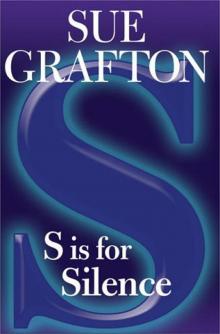 S Is for Silence
S Is for Silence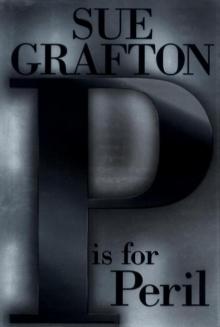 P Is for Peril
P Is for Peril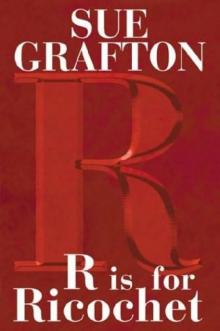 R Is for Ricochet
R Is for Ricochet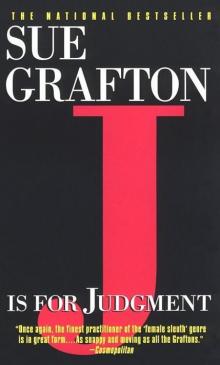 J Is for Judgment
J Is for Judgment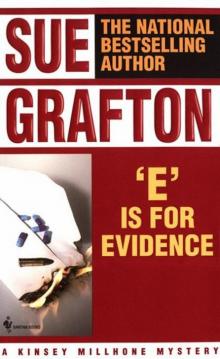 E Is for Evidence
E Is for Evidence T Is for Trespass
T Is for Trespass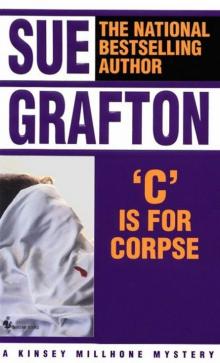 C Is for Corpse
C Is for Corpse U Is for Undertow
U Is for Undertow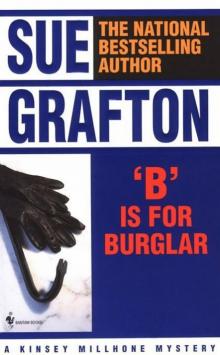 B Is for Burglar
B Is for Burglar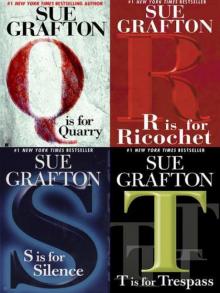 Four Sue Grafton Novels
Four Sue Grafton Novels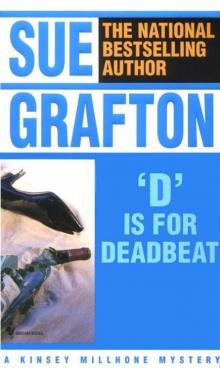 D Is for Deadbeat
D Is for Deadbeat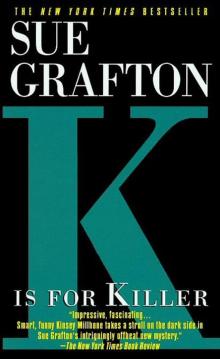 K Is for Killer
K Is for Killer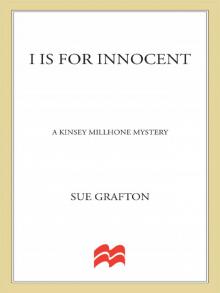 I Is for Innocent
I Is for Innocent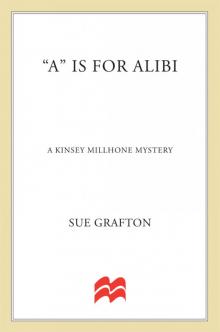 A Is for Alibi
A Is for Alibi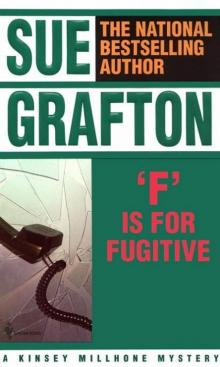 F Is for Fugitive
F Is for Fugitive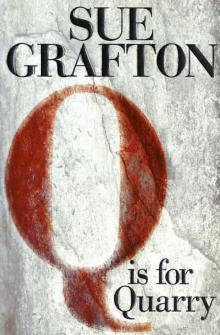 Q Is for Quarry
Q Is for Quarry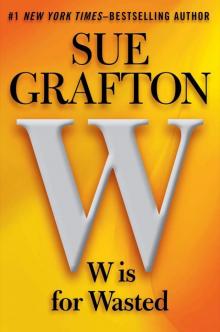 W Is for Wasted
W Is for Wasted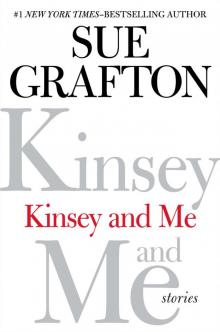 Kinsey and Me: Stories
Kinsey and Me: Stories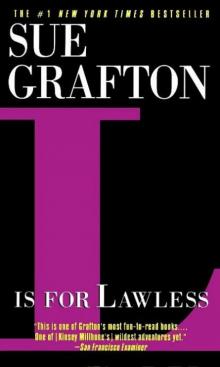 L Is for Lawless
L Is for Lawless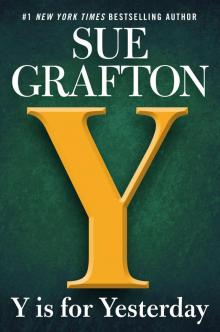 Y Is for Yesterday
Y Is for Yesterday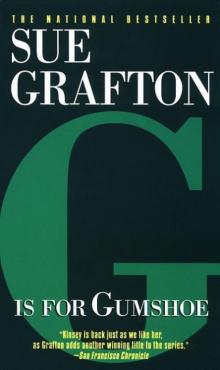 G Is for Gumshoe
G Is for Gumshoe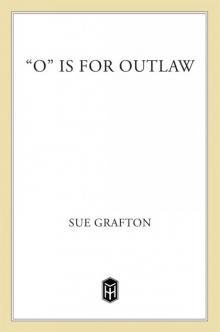 O Is for Outlaw
O Is for Outlaw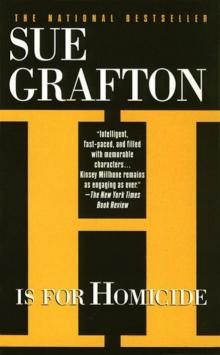 H Is for Homicide
H Is for Homicide X
X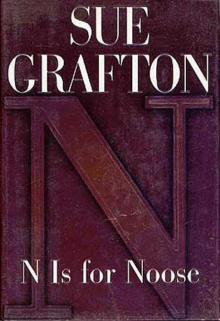 N Is for Noose
N Is for Noose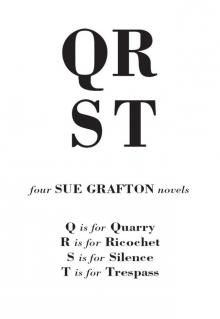 Three Complete Novels: A Is for Alibi / B Is for Burglar / C Is for Corpse
Three Complete Novels: A Is for Alibi / B Is for Burglar / C Is for Corpse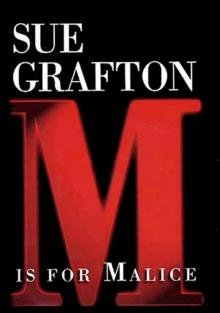 M Is for Malice
M Is for Malice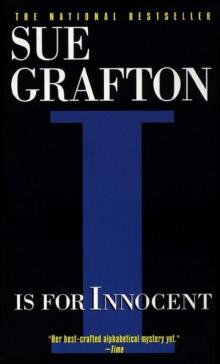 I is for INNOCENT
I is for INNOCENT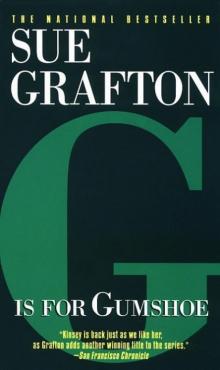 G is for GUMSHOE
G is for GUMSHOE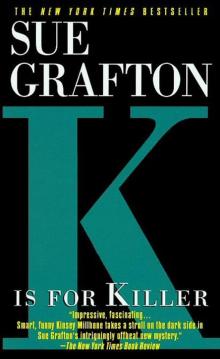 K is for KILLER
K is for KILLER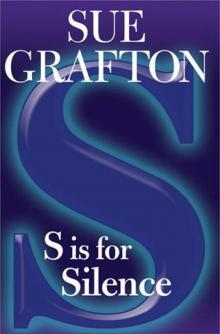 S is for SILENCE
S is for SILENCE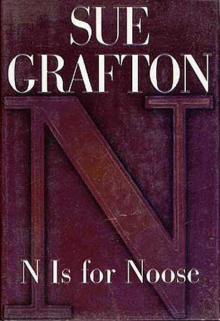 N is for NOOSE
N is for NOOSE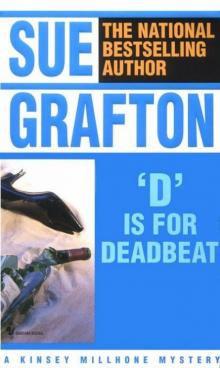 D is for DEADBEAT
D is for DEADBEAT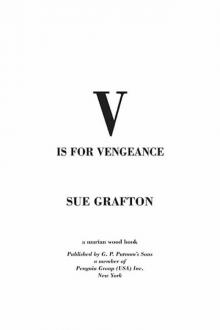 V is for Vengeance
V is for Vengeance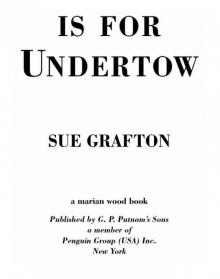 U is for Undertow
U is for Undertow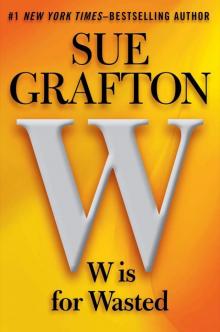 W Is for Wasted km-23
W Is for Wasted km-23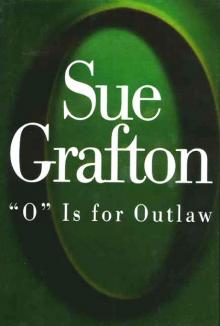 O is for OUTLAW
O is for OUTLAW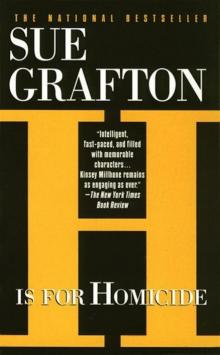 H is for HOMICIDE
H is for HOMICIDE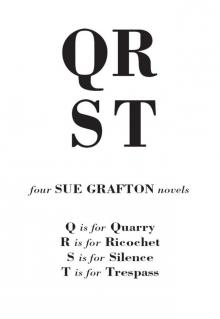 Sue Grafton Novel Collection
Sue Grafton Novel Collection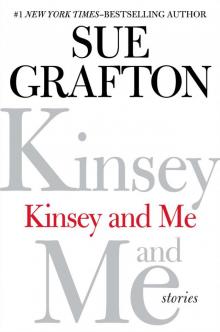 Kinsey and Me
Kinsey and Me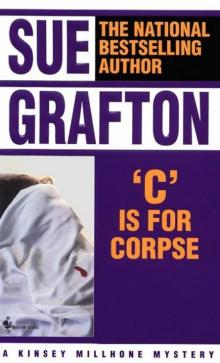 C is for CORPSE
C is for CORPSE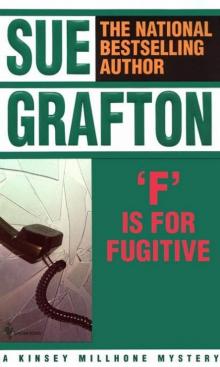 F is for FUGITIVE
F is for FUGITIVE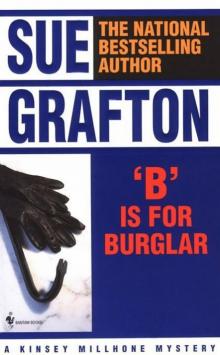 B is for BURGLAR
B is for BURGLAR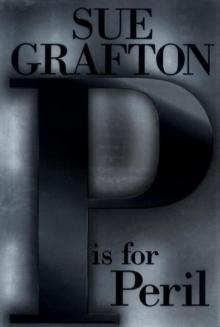 P is for PERIL
P is for PERIL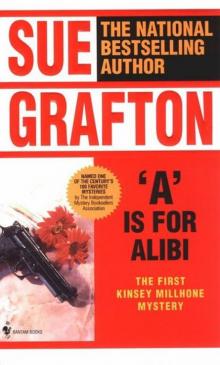 A is for ALIBI
A is for ALIBI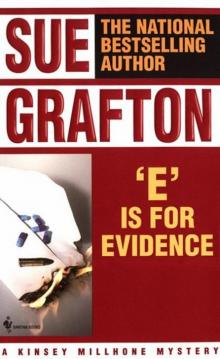 E is for EVIDENCE
E is for EVIDENCE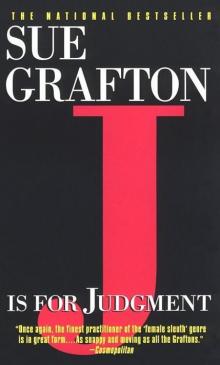 J is for JUDGMENT
J is for JUDGMENT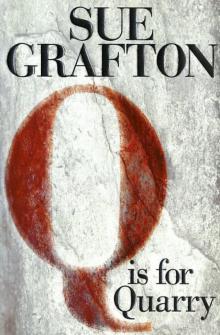 Q is for QUARRY
Q is for QUARRY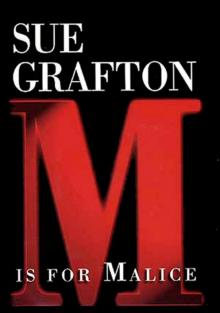 M is for MALICE
M is for MALICE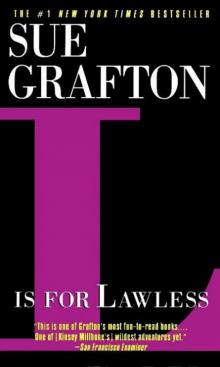 L is for LAWLESS
L is for LAWLESS